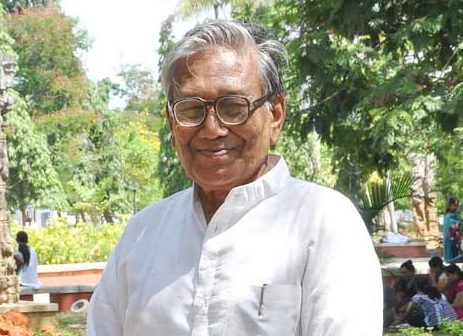SN Misra
Manoj Das was a literary prodigy, whose first collection of poems, Satabdira Artanada came out when he was 15 and he edited a journal, Diganta, a year later. He is by far the tallest bilingual writer that Odisha has produced. While his writing in Odia is prodigious, he is equally respected for his exceptional craft in writing short stories in English and commentating about myriad social issues in reputed newspapers. Graham Greene, the celebrated English writer, compared him with RK Narayan, the first Indian fiction writer in English to catch the global eye, with ‘perhaps an added mystery’. When RK Narayan passed away in 2001, Manoj Das wrote a delectable Obit. “He cooked no delicacies out of his country’s shortcoming, churned out no concoction of realism and erotica but focussed on little ironies of life.” Manoj Das believed that while RK Narayan did not believe in occult, he was a passionate mystique!
Manoj Das flirted with communism as a student leader. His disillusionment with Marxism happened on a trip to Indonesia in June 1956, when he met DN Aidit, Secretary General of Communist Party. Aidit in that meeting brought out how Khrushchev had brought out in a report, the brutal tyranny of Stalin. Stalin and Lenin who had replaced God in the minds of communists in USSR and India had become fallen Gods. It is largely this frustration that drove him to undertake the spiritual journey and embrace the philosophy of Sri Aurobindo. He moved to Pondicherry in 1963. Marx disappointed him, spiritualism spurred his inner self and literature catapulted him, thereafter.
He was against sectarian secularism and exhorted his fellowmen to imbibe the true spirit of secularism. He recalls how in a get together for celebrating Sahitya Akademi award to Kalindi Charan Panigrahi in 1968, Sahid Zahir, the poet sang the glory of Krishna. For him the myth of Krishna was not the monopoly of Hindus but an inheritance of all Indians. Secular Hindus for him must try to broaden the outlook of non-Hindu brothers and sisters. Secular intellectuals should also divert their zeal to lift the orthodox Hindu society from the pit of casteism. He wrote that Ayurveda cannot be shunned by non-Hindus, just as Unani cannot be dismissed by Hindus just because the medieval Muslim physician brought the systems from Byzantine Greece!
Manoj Das is the master of satire and wit. His wit and humanism comes through, when he asks to choose between a dreaded terrorist and a mob leader who punctures the tyre of a rickshaw during rasta roko, carrying a slum dwelling woman in the throes of labour.
Village and rural culture of Odisha are the central tools of Das’ writing. Lack of respect for rural grace along with the inability to see the consequences of certain kinds of development activities often appear in his story. He is like Indian Chekhov in his awareness of human misery and ironies of life and in the art of exposing all that is vulgar, shameful and pitiable. A master of spinning of yarn, the reader seems to watch leisurely through a corridor and ante chamber like the merry pilgrims of Chaucer ambling their way to Canterbury. His stories contain messages which are not didactic but very subtle. While he presents predicament in his stories, his world is not dark and bleak like Kafka. His writing is also refreshingly free from horror, sex and violence as he strongly believed that negative impulses can be transcended by a feeling of love, sympathy and fellow feeling.
Manoj Das wrote a number of delectable edits, commentating on a number of social issues. On the centenary year of Jallianwala Bagh he writes, that no one can undo history but a British apology would have been symbolic “of collapse of colonies, monarchy and feudal system as well as triumph of ideas of equality”. Should Britain apologise, its dignified humility would indicate a new chapter in civilisation. He also laments that sense of humour is fading, as Shankar’s weekly closed in 1975, due to commercial non-viability. Its satire and sympathy mingled harmoniously in cartoons, prompting Nehru to say: Do not spare me Shankar. The punch was closed in 1998.
Quest for Indianness has remained the most central concern of his artistic endeavour. He depicted transition of rural Odisha from feudalism to capitalism. He was sympathetic towards struggle that females had to undergo in patriarchal social setup of India. Lakshmi’s Adventure is a heart-rending story of a poor mother who cannot afford to buy a frock for her daughters. Novella Cyclones is a critique of environmental degradation of eco-friendly villages where government officials and greedy corporate join hands to devastate environment. Manoj Das was not merely Vishnu Sharma of Odisha, peddling mythology and mystique, but was a humanist par excellence. He was disillusioned with Marxism but his writing persistently carried his passionate plea for socio-economic and gender justice. He was always weary of false freedom as emancipation from the bondage of soil is no freedom for the tree.
The writer teaches Constitutional Law.
